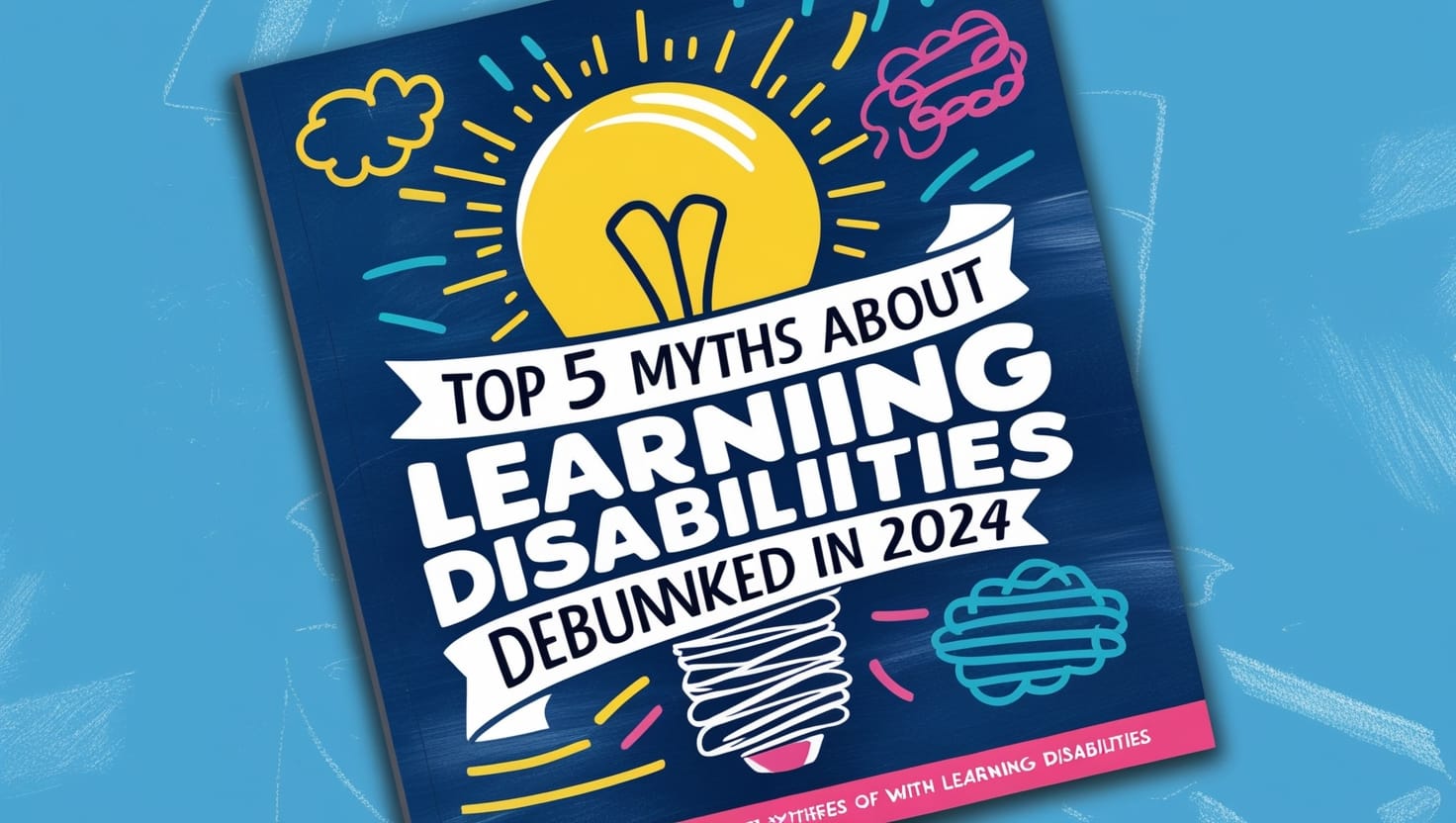
Top 5 Myths About Learning Disabilities Debunked in 2024-Learning disabilities (LD) affect millions of children and adults around the world, but despite growing awareness, there are still many misconceptions surrounding these conditions. Misunderstanding learning disabilities can lead to stigma, missed opportunities for support, and ineffective educational strategies. In this article, we will debunk five of the most common myths about learning disabilities in 2024, providing clearer insights to help individuals better understand these challenges.
Myth 1: People with Learning Disabilities Aren’t Intelligent
One of the biggest misconceptions about learning disabilities is that they equate to a lack of intelligence. This myth suggests that if someone struggles with reading, math, or writing, it must mean they are less smart than their peers. In reality, learning disabilities do not reflect a person’s intelligence.
Individuals with learning disabilities can possess average or even above-average intelligence. The key difference lies in how their brains process information. For example, someone with dyslexia might struggle with reading but excel in creative thinking, problem-solving, or other cognitive skills. With the right support, these individuals can thrive in academic and professional settings, demonstrating that intelligence is not determined by the presence of a learning disability.
Myth 2: Learning Disabilities Are Just an Excuse for Poor Performance

Another common myth is that learning disabilities are often used as an excuse for poor academic performance or laziness. This belief undermines the challenges faced by students with LD and minimizes the real efforts they put into their work.
Learning disabilities are not a matter of willpower. They are neurological conditions that affect how a person processes information. Students with LD may need extra time, specialized strategies, or different tools to perform tasks that others may find easy. This does not mean they are lazy or unmotivated; it simply means they require accommodations to succeed in a way that best suits their learning needs.
Myth 3: Learning Disabilities Are Only a Childhood Issue
Many people believe that learning disabilities are only a concern for children and that individuals “outgrow” these difficulties as they get older. However, learning disabilities are lifelong conditions. While some individuals may develop coping strategies or find ways to manage their challenges more effectively over time, they do not disappear.
In fact, adults with learning disabilities may continue to face challenges in areas like reading comprehension, writing, or organization. Without proper support, these difficulties can impact their professional and personal lives. It’s important for society to understand that learning disabilities require long-term awareness, accommodation, and support to help individuals succeed throughout their lives. (Read More: Education AI and the Future of Teaching: Innovations That Will Define 2024)
Myth 4: All Learning Disabilities Are the Same

Another myth that needs debunking is the idea that all learning disabilities are the same. In reality, learning disabilities are a broad category that encompasses several distinct conditions, each with its own set of challenges.
For example, dyslexia primarily affects reading and decoding words, while dyscalculia impacts a person’s ability to understand math concepts and perform basic calculations. Dysgraphia, on the other hand, affects writing skills, including handwriting, spelling, and organizing thoughts on paper. Additionally, auditory processing disorder can make it difficult for individuals to interpret and respond to verbal instructions.
Because learning disabilities vary in their manifestations, it is crucial to treat each case individually, tailoring educational approaches and interventions to meet the specific needs of each student. (Read More: 7 Games in Legends of Learning for Teachers and Students)
Myth 5: Children with Learning Disabilities Are Less Likely to Succeed in School
A deeply ingrained myth is that children with learning disabilities are destined to struggle in school and are less likely to succeed academically. While it is true that students with LD may face certain academic challenges, this does not mean they cannot succeed.
In fact, many individuals with learning disabilities go on to excel in their studies and professional careers. With the right accommodations, such as extended test times, specialized tutoring, or assistive technologies, students with LD can often perform at the same level as their peers. Furthermore, learning disabilities often come with unique strengths, such as creativity, problem-solving skills, and a different approach to thinking that can benefit them in both academic and real-world situations.
The key is early identification and intervention. The sooner a learning disability is identified, the earlier support can be put in place, which increases the chances of success. Teachers, parents, and schools play a crucial role in fostering an environment where students with learning disabilities can thrive. (Read More: Top 5 Apps for Learning ASL: Boost Your American Sign Language Skills)
Breaking the Stigma: A Path Toward Understanding

Debunking these myths about learning disabilities is an essential step in building a more inclusive and supportive environment for those affected. It’s important to recognize that learning disabilities are not a reflection of a person’s intelligence or effort. Instead, they are neurological conditions that require understanding, proper diagnosis, and appropriate accommodations to help individuals reach their full potential.
In 2024, there is growing awareness of the importance of addressing learning disabilities with empathy and evidence-based strategies. By educating ourselves about the realities of learning disabilities, we can help break down harmful stereotypes and create a society where every learner has the opportunity to succeed, regardless of their challenges.
Conclusion article Top 5 Myths About Learning Disabilities Debunked in 2024
Learning disabilities are often misunderstood, but it’s crucial to challenge the myths surrounding them. Individuals with LD are not less intelligent, lazy, or incapable of success. With the right support, tailored strategies, and a focus on strengths, people with learning disabilities can thrive in academic, personal, and professional life. By debunking these common myths, we can foster a more inclusive world that values diversity in learning and ensures everyone has the tools they need to succeed.





1 thought on “Top 5 Myths About Learning Disabilities Debunked in 2024”